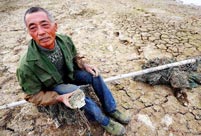Rome, November 20 - Cash-strapped Italians will be spending even less this Christmas than in previous years due to the lingering impact of Italy's deepest recession in over two decades, consumer groups said Wednesday.
Spending on Christmas gifts will fall by 11.2% this holiday season compared with last year for an average gift budget of 132 euros per family, the consumers associations Federconsumatori and Adusbef said in a statement.
That is even lower than the average of 148 euros per family last Christmas, when total spending came in at between 3.5 billion euros and 3.8 billion euros, the groups added. Spending will be "highly targeted" toward gifts for children this year, they said.
"The results reveal a disheartening situation," they said in a statement with their annual holiday consumer spending study. Its findings "confirm a trend that has continued for years," the groups said in their statement.
They urged the Italian government to find ways to stimulate demand by getting more money into family budgets which will, in turn, be spent and boost economic growth. "To counter this dangerous trend, it is critical to stimulate a recovery in market demand," said Rosario Trefiletti and Elio Lannutti, leaders of the consumer groups.
The findings of further spending reductions are bad news for Italian retailers, an important segment of the economy that relies heavily on holiday spending to remain in business.
The government of Premier Enrico Letta is banking on the country pulling out of its longest recession in over two decades by the end of 2013.
However, Letta's government has been criticized for not doing enough to combat the recession including its 2014 budget law that many say has been too timid with tax cuts. Still, chief economist Carlo Padoan of the Organization for Economic Cooperation and Development (OECD) said earlier this week Italian government measures are creating conditions to generate "a virtuous circle" in terms of economic growth and debt reduction.
That includes slashing public spending to free up resources to cut taxes in growth-stimulating measures, such as reducing the cost of labour.
But, as consumer confidence and subsequent spending are lagging indicators, it can take considerable time before any economic turnaround is felt by families. Those families are struggling to deal with such financial concerns as Italy's high unemployment that reached a record-high 12.5% in September, a string of layoff announcements that dampen consumer confidence, and concerns about employers that are slow to pay their staff wages owed, according to the consumer groups.
As well, many companies are warning that they can't afford to pay Christmas bonuses this year, they added.
Early estimates from the groups' study concludes that spending on clothing and footwear during the holiday season will fall by 12% while gifts of household goods such as furniture and appliances will drop by fully 31%.
Spending on electronics will drop by 6%.
The only increase expected is in smaller-ticket items such as books and CDs, partly because of strong promotions and relatively low prices, the study said. Economic concerns were illustrated with a study released Wednesday by national statistical agency Istat that found almost six in 10 Italians see themselves as worse off this year compared with 2012.
The agency said 58.6% of people told a survey that their economic situation had deteriorated, compared to 55.8% in a study last year.
"The decline (in the economic situation) was general across that nation, although it was greater in the north," Istat said.
The agency added, however, that overall life-satisfaction levels were steady at an average of 6.8 out of 10, the same as in 2012.
At the same time, employers' association Confindustria warned Wednesday that it believes Italian gross domestic product (GDP) will contract by 0.1% in the third quarter this year, following a 0.3% drop in the second quarter.
To illustrate the dramatic fall in the economy since the global economic crisis triggered recessions all over the world, Confindustria noted that third-quarter GDP this year was fully 9.1% lower than during the same period in 2007.
 Luxury-cars parade held in Dubai
Luxury-cars parade held in Dubai Special forces take tough training sessions
Special forces take tough training sessions Fire guts 22-storey Nigeria commercial building in Lagos
Fire guts 22-storey Nigeria commercial building in Lagos Self-made farmer billionaire donates 69 villas at hometown
Self-made farmer billionaire donates 69 villas at hometown A courier's crazy
A courier's crazy  Severe drought hits China's largest freshwater lake
Severe drought hits China's largest freshwater lake Top 10 celebrity moms in China
Top 10 celebrity moms in China Weekly Sports Photos:
Weekly Sports Photos: Gingko leaves turn brilliant golden yellow in Beijing
Gingko leaves turn brilliant golden yellow in Beijing Maritime counter-terrorism drill
Maritime counter-terrorism drill College students want partner for sex needs
College students want partner for sex needs Male belly dancer in women’s fitness club
Male belly dancer in women’s fitness club  15 best rivers for travelers in world
15 best rivers for travelers in world National Geographic Traveler Photo Contest
National Geographic Traveler Photo Contest Weekly Sports Photos
Weekly Sports PhotosDay|Week|Month